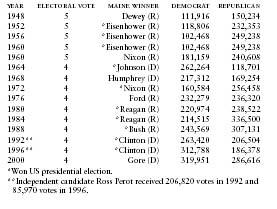Maine
Political parties
Maine's two major political parties are the Democratic and the Republican, each affiliated with the national party. An independent candidate, James B. Longley, beat the candidates of both major parties in the gubernatorial election of 1974.
During the early decades of statehood, Jeffersonian and Jacksonian Democrats remained in power quite consistently. In 1854, however, reformers rallied around the new Republican Party, which dominated Maine politics for the next hundred years. Maine's strong Republican tradition continued into the middle and late 1950s, when Margaret Chase Smith distinguished herself in the US Senate as a leader of national importance. The rise of Democrat Edmund S. Muskie, elected governor in 1954 and 1956 and to the first of four terms in the US Senate in 1960, signaled a change in Maine's political complexion. Muskie appealed personally to many traditionally Republican voters, but his party's resurgence was also the result of demographic changes, especially an increase in the proportion of French-Canadian voters.
In the November 1994 elections, Independent Angus King was voted into the executive office, and Maine became the only state in the nation with an Independent governor. King was reelected in 1998. In 2002, Democrat John Baldacci was elected governor. In 1994 Republican Olympia Snowe won the US Senate seat vacated by retiring Democrat George J. Mitchell (she was reelected in 2000); in 1996 Republican Susan E. Collins won the seat left vacant by retiring three-term senator William S. Cohen, also a Republican (Collins was reelected in 2002). In the 2000 presidential elections Democrat Al Gore won 49% of the presidential vote, Republican George W. Bush received 44%, and Green Party candidate Ralph Nader won 6%. In 2002 elections, Maine Democrats retained control of both US House seats. Also in 2002 there were 912,092 registered voters. In 1998, 32% of registered voters were Democratic, 29% Republican, and 39% unaffiliated or members of other parties. Before the November 2003 elections, the state house of representatives had 80 Democrats, 67 Republicans, and four independents, while the state senate had 18 Democrats and 17 Republicans. The state had four electoral votes in the 2000 presidential election.

Maine Presidential Vote by Major Political Parties, 1948–2000
| YEAR | ELECTORAL VOTE | MAINE WINNER | DEMOCRAT | REPUBLICAN |
| *Won US presidential election. | ||||
| **Independent candidate Ross Perot received 206,820 votes in 1992 and 85,970 votes in 1996. | ||||
| 1948 | 5 | Dewey (R) | 111,916 | 150,234 |
| 1952 | 5 | *Eisenhower (R) | 118,806 | 232,353 |
| 1956 | 5 | *Eisenhower (R) | 102,468 | 249,238 |
| 1960 | 5 | *Eisenhower (R) | 102,468 | 249,238 |
| 1960 | 5 | Nixon (R) | 181,159 | 240,608 |
| 1964 | 4 | *Johnson (D) | 262,264 | 118,701 |
| 1968 | 4 | Humphrey (D) | 217,312 | 169,254 |
| 1972 | 4 | *Nixon (R) | 160,584 | 256,458 |
| 1976 | 4 | Ford (R) | 232,279 | 236,320 |
| 1980 | 4 | *Reagan (R) | 220,974 | 238,522 |
| 1984 | 4 | *Reagan (R) | 214,515 | 336,500 |
| 1988 | 4 | *Bush (R) | 243,569 | 307,131 |
| 1992** | 4 | *Clinton (D) | 263,420 | 206,504 |
| 1996** | 4 | *Clinton (D) | 312,788 | 186,378 |
| 2000 | 4 | Gore (D) | 319,951 | 286,616 |